1. Personalized Guest Experiences
AI systems in hospitality analyze a wealth of guest data – from past stays and preferences to real-time feedback – to tailor every aspect of the guest experience. This personalization can manifest in customized room settings (such as automatically adjusting lighting and temperature to a guest’s known liking), targeted activity or dining recommendations, and special offers aligned with individual interests. By anticipating guest needs and preferences, AI helps hotels deliver more memorable and comfortable stays. The overall effect is a boost to guest satisfaction and loyalty, as travelers feel recognized and valued on a personal level. However, this must be balanced with privacy considerations, ensuring guests are comfortable with how their data is used.

Research indicates that travelers respond positively to personalization, but there remains a gap in what is delivered. In one industry survey of over 1,700 hotel guests, 61% said they would be willing to pay more for customized hotel experiences, yet only 23% reported receiving a highly personalized experience during a recent stay. Another study found 78% of travelers are more likely to book accommodations that offer personalized amenities, with nearly half willing to share personal data to enable those tailored services. These findings underline both the desire for AI-driven personalization and the opportunity for hotels to better capitalize on it. By using AI to interpret guest data and preferences, hospitality providers can bridge this gap – for example, automatically remembering a guest’s preferred pillow type or suggesting activities based on past behavior. As hotels implement such AI personalization, they stand to increase guest satisfaction scores and repeat bookings by meeting modern travelers’ expectations for individualized service.
2. Dynamic Pricing
Dynamic pricing in hospitality refers to continuously adjusting room rates based on supply-and-demand factors, and AI has made this practice far more precise and responsive. By processing real-time data – such as current booking pace, local events, competitor pricing, and even weather forecasts – AI algorithms can recommend optimal pricing at any given moment. This means hotels can raise rates during high-demand periods to maximize revenue and lower them in lean periods to stimulate occupancy. Unlike traditional manual pricing updates, AI-driven dynamic pricing updates happen instantaneously and can account for complex patterns humans might miss. The result is an overall more efficient revenue management strategy that helps hotels fill more rooms and improve financial performance without sacrificing competitiveness.
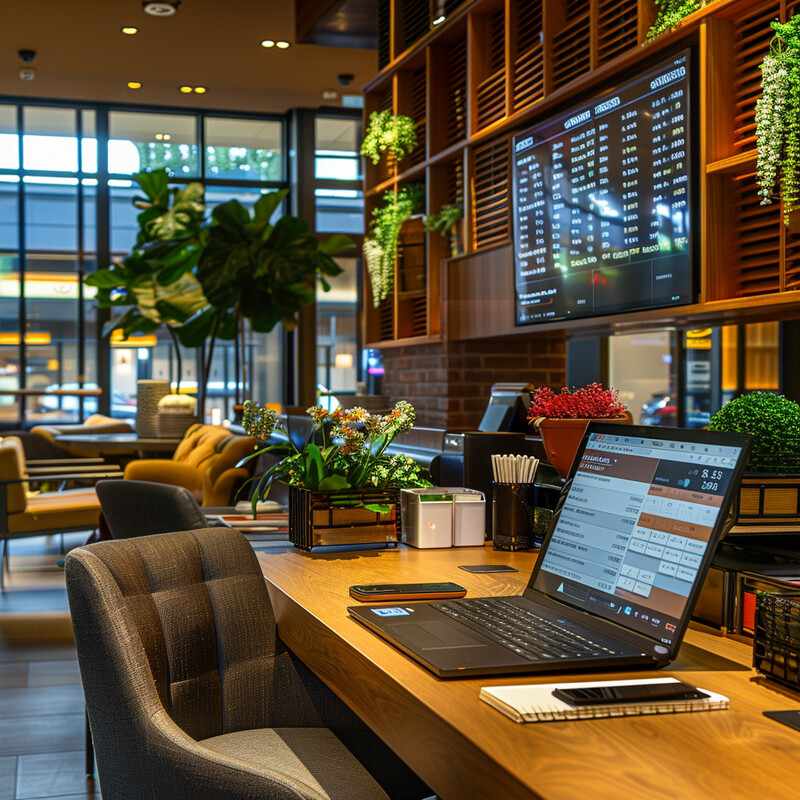
The financial impact of AI-driven pricing is significant. According to an analysis by McKinsey, hotels leveraging AI for revenue management reported a 17% increase in revenue and a 10% boost in occupancy compared to similar hotels not using AI. These gains illustrate how dynamic pricing algorithms optimize room rates to match real-time market demand more effectively than static pricing models. For example, an AI system might detect a sudden surge in online searches for a destination and immediately raise a hotel’s rates to capitalize on the increased interest, or conversely drop rates when a large event is canceled. Such agility in pricing ensures that a hotel can maximize income during peak times and minimize empty rooms during slow times. Over the course of a year, this data-driven approach translates into higher revenue per available room and more consistent occupancy levels. The McKinsey findings underscore that embracing AI for dynamic pricing isn’t just a tech upgrade – it directly contributes to improved profitability and competitiveness in the hospitality sector.
3. Chatbots and Virtual Concierges
AI-powered chatbots and virtual concierges serve as always-available assistants for hotel guests. They can handle a range of tasks through text or voice interfaces – answering common questions (e.g. pool hours or Wi-Fi passwords), facilitating bookings and reservations, providing directions or local recommendations, and even managing simple service requests like extra towels. By using natural language processing, these bots interpret guest inquiries and respond instantly with relevant information or actions. This 24/7 availability greatly reduces wait times; guests get help in seconds regardless of the hour, which in turn frees up human staff to focus on more complex or high-touch customer needs. Virtual concierges also maintain a consistent level of service (they won’t forget details or get tired) and can communicate in multiple languages, enhancing the experience for international travelers. Overall, AI chatbots complement the hotel’s service team by improving efficiency and ensuring guests feel attended to at all times.
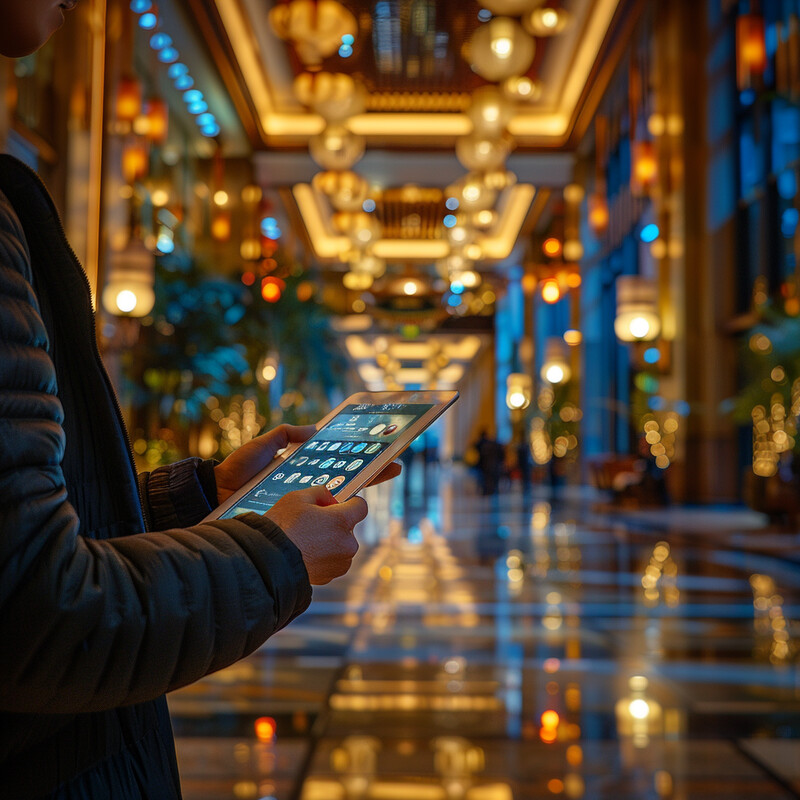
Studies show that hotel guests are increasingly comfortable with and appreciative of chatbot assistance for routine interactions. A recent industry survey found that about 70% of guests consider chatbots helpful for simple inquiries and tasks – such as checking in, asking for the Wi-Fi code, or scheduling a wake-up call. Hotels deploying AI chatbots have reported tangible benefits like faster response times and a significant portion of customer queries being resolved without human intervention. For instance, Marriott International’s chatbot (available via their app and platforms like Facebook Messenger) handles basic FAQs and booking queries, allowing the chain to field millions of conversations simultaneously. This not only improves the guest experience by providing immediate answers, but it also can lead to cost savings; by some estimates, automating customer service through AI can result in up to a 30% reduction in customer support costs for hospitality businesses. Additionally, as bots address routine questions, staff are free to engage in more personalized service or problem-solving, thereby elevating overall service quality. The high usage and satisfaction rates indicate that, when implemented well, virtual concierges effectively augment hotel customer service teams.
4. Operational Efficiency
AI technologies are streamlining many behind-the-scenes operations of hotels, making day-to-day management more efficient and cost-effective. Key areas of impact include energy management (optimizing heating, cooling, and lighting based on occupancy patterns), inventory and supply chain (predicting usage rates of everything from toiletries to restaurant ingredients to reorder just-in-time), and workforce management (adjusting staff schedules in real-time according to hotel occupancy and guest needs). By analyzing large datasets and learning from patterns, AI can forecast operational needs with high accuracy – for example, anticipating a spike in housekeeping demand when a wave of check-outs is predicted or reducing HVAC output in unoccupied rooms. These optimizations reduce wastage of resources like electricity, water, and labor hours. The outcome is not only lower operating costs but often improved service quality (since the right resources are in the right place at the right time). In addition, AI-driven dashboards give managers real-time visibility into operations, enabling quicker decisions and proactive adjustments before issues arise. Overall, AI acts as an intelligent backbone for hotel operations, driving both efficiency and sustainability.
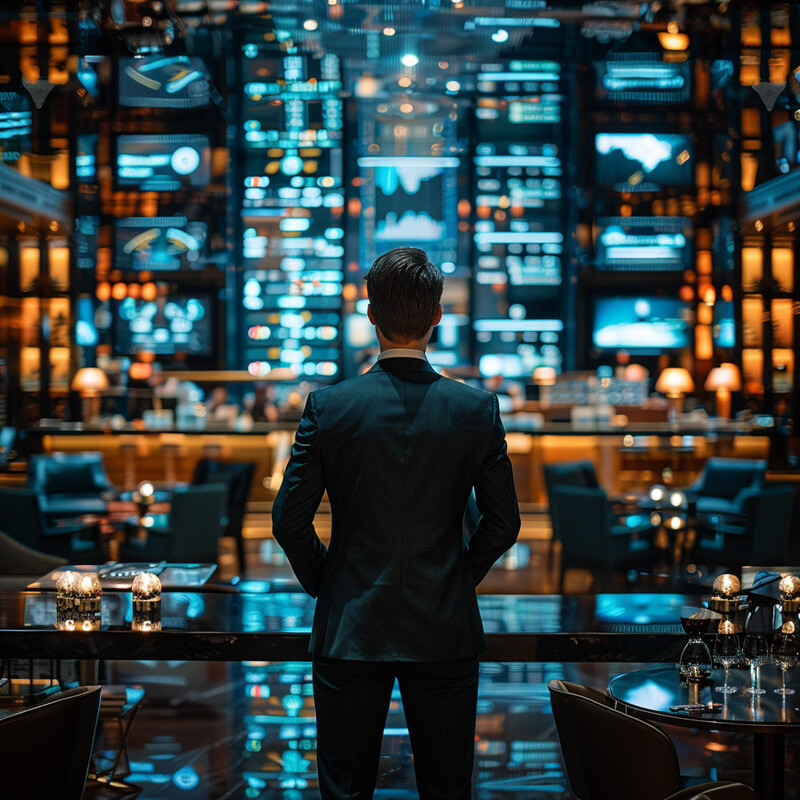
One striking example of AI’s impact on efficiency is in energy usage. Hotels implementing AI-driven energy management systems have significantly cut their utility consumption. In fact, recent industry data shows that AI can reduce energy consumption in hotels by up to 30%, substantially lowering costs and carbon emissions. These savings come from AI’s ability to continuously regulate and adjust building systems – for instance, smart thermostats and lighting that respond to real-time occupancy or even weather forecasts. Hilton Hotels demonstrated this at scale with an AI-based platform (“LightStay”) that monitors energy, water, and waste across all its properties; over a decade, Hilton reported over $1 billion in cumulative savings and a 20% reduction in energy use, largely attributable to AI optimizations. Such efficiency gains are not just theoretical – they translate to millions of dollars saved on electricity and fuel bills for large hotel portfolios. Moreover, by automating routine decisions (like turning off lights in empty conference rooms or optimizing elevator usage), AI ensures that no single opportunity for saving is missed. This level of operational fine-tuning was difficult to achieve consistently with manual controls alone. The 30% figure underlines the magnitude of improvements possible: hotels embracing AI for facilities management are running leaner and greener operations, directly improving their bottom line and environmental footprint.
5. Predictive Maintenance
Predictive maintenance refers to using AI and sensors to anticipate when equipment will need servicing or repair before a breakdown occurs. In a hotel setting, this means critical systems – HVAC (heating, ventilation, air conditioning), elevators, kitchen appliances, laundry machines, etc. – are continuously monitored by AI for signs of wear or performance drop-offs. By analyzing patterns (like a machine’s temperature, vibration, or runtime hours), AI can flag anomalies that historically precede a failure. Maintenance staff are then alerted to check or service the equipment proactively, at a time convenient for operations. This approach stands in contrast to reactive maintenance (fixing things only after they break) and even routine scheduled maintenance (which might be too late or wasteful if done too early). The benefits of AI-driven predictive maintenance in hospitality are substantial: fewer sudden breakdowns that disrupt guest services (e.g., no more unexpected HVAC outages on a hot day), extended lifespan of expensive equipment (since issues are addressed before they cause major damage), and more efficient allocation of maintenance resources. Ultimately, it helps hotels ensure a smooth guest experience by keeping all facilities up and running reliably through foresight and timely intervention.
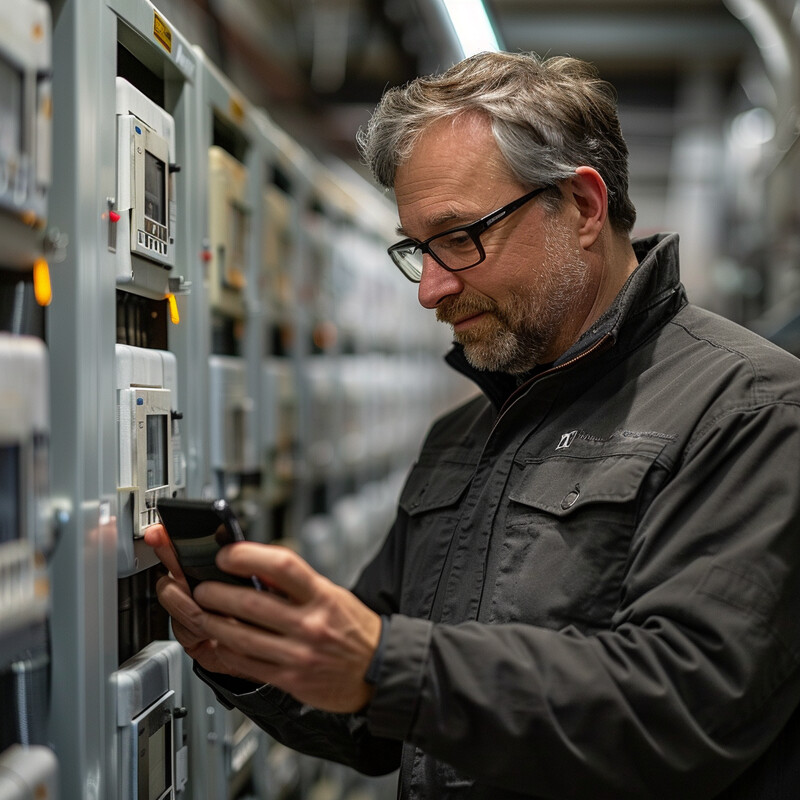
Hotels that have adopted AI-based predictive maintenance have seen a dramatic decrease in unplanned equipment downtime. Industry reports show that AI-driven predictive maintenance can reduce equipment downtime by around 40% in hospitality operations. For example, an AI system might detect that a hotel’s chiller unit is starting to work harder than usual (drawing more power or running longer cycles) and predict a potential malfunction – allowing engineers to replace a failing part during a scheduled maintenance window rather than during a peak usage time. By preventing unexpected breakdowns, hotels avoid scenarios like out-of-service elevators or kitchen equipment failures that could inconvenience guests and hurt revenue. Additionally, fewer emergency repairs mean lower maintenance costs; spare parts and labor can be scheduled in advance, often at lower cost than urgent call-outs. A 40% reduction in downtime also implies improved safety, as critical systems (like fire alarms or security cameras) are less likely to fail when needed. Peer-reviewed studies in facility management have corroborated these benefits, noting not only less downtime but also savings in maintenance expenses on the order of 10–15%. The data makes it clear that predictive maintenance powered by AI isn’t just about convenience – it provides a strong economic return by keeping hotels operating smoothly and continuously.
6. Enhanced Security
AI is elevating security and safety in hotels through intelligent surveillance and faster threat detection. Modern hotels are deploying AI-enhanced camera systems that don’t just record footage but also analyze it in real time – for instance, identifying unusual behavior, unauthorized access to restricted areas, or unattended objects. By using computer vision, these systems can alert security staff the moment something suspicious occurs (rather than relying on guards to notice on CCTV screens). AI is also employed in biometric access control, such as facial recognition for verifying guests or staff entering the building or certain floors, thereby quickly flagging persons who aren’t authorized. Moreover, AI helps in cybersecurity within hotels, monitoring network traffic to detect potential breaches that could compromise guest data. In emergency situations, AI can be used to predict crowd movements for efficient evacuations or to triage alarms (distinguishing, say, a true fire from a false alarm). Altogether, integrating AI means a more proactive security posture: potential incidents are identified and addressed before they escalate, and responses are faster and better informed. This leads to a safer environment for both guests and employees, deterring crime and minimizing disruptions.
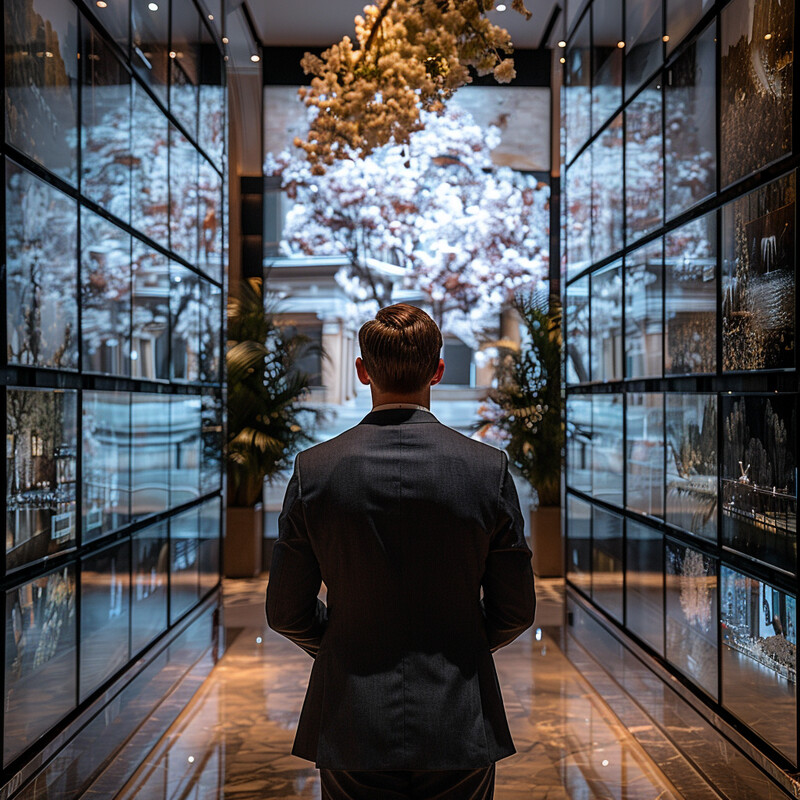
AI-driven security measures have demonstrated a remarkable ability to reduce incidents and improve response times. A report by Deloitte, examining smart security technology in urban environments, found that advanced surveillance AI could reduce crime rates by 30–40% and cut emergency response times by 20–35% when implemented broadly. While these figures are from city-wide deployments, they highlight the potential impact for private venues like hotels. For example, a hotel using an AI surveillance platform might see a drop in theft or trespassing incidents because the system immediately detects and alerts staff to suspicious behaviors (like someone loitering in a restricted area or forcing a door). Additionally, if an incident does occur, AI helps security teams react faster – by automatically tracking a suspect’s location through camera feeds or by instantly notifying the nearest security personnel via mobile alerts. Some large hotel casinos in Las Vegas have adopted such systems and reported noticeable declines in security breaches and more efficient resolution of issues. On the access control side, facial recognition at entry points can prevent unauthorized visitors (enhancing guest safety) and even streamline check-ins for authorized guests. The overarching trend is clear: by augmenting human security teams with AI vigilance, hotels can create a much safer environment. The Deloitte findings reinforce that investing in AI for security isn’t just about convenience – it tangibly improves safety outcomes.
7. Guest Feedback Analysis
Hotels receive feedback from numerous channels – post-stay surveys, online review sites, social media comments, and in-person guest complaints. AI tools enable management to aggregate and analyze this voluminous feedback far more efficiently than manual methods. Through natural language processing, AI can sift through thousands of guest reviews and comments to detect sentiment (positive, neutral, negative) and pinpoint specific topics guests mention (e.g., cleanliness, staff friendliness, breakfast quality). This analysis helps identify key drivers of satisfaction and areas in need of improvement. Crucially, AI doesn’t just tally up issues; it can prioritize them by frequency or impact, guiding hotel managers to what matters most to guests. For example, if many reviews mention slow check-in, the AI will flag that trend for management to address. Some systems even route urgent concerns (like a safety complaint) immediately to supervisors for quick action. By closing the feedback loop faster, hotels can make data-driven improvements – whether it’s retraining staff, fixing a recurring maintenance problem, or introducing a new service that guests are asking for. Over time, using AI for feedback analysis leads to higher guest satisfaction scores and better online reputations, since issues are systematically identified and resolved.

Harnessing AI for guest feedback isn’t just theoretical – hotel groups that use these tools have seen measurable improvements in guest satisfaction metrics. For instance, Minor Hotels, an international hotel group, implemented an AI-driven feedback analysis and case management system across its properties. Within a year, they achieved a 14% increase in their Net Promoter Score (NPS), indicating more guests willing to recommend their hotels, and also improved their response to guest complaints – reducing the response time by about 30% for low-satisfaction feedback. Moreover, their overall online reputation score (a composite of review ratings, sometimes called a Global Review Index) rose by approximately 1.3%, which is significant for a large portfolio of hotels. These gains were credited to the AI system’s ability to alert staff quickly to negative feedback and track resolution of each issue, ensuring no guest concern fell through the cracks. Another brand using sentiment analysis noted that after identifying a frequent complaint (noise on a particular floor) and fixing it, their review scores for “quietness” improved within weeks. Such examples show that AI can convert unstructured feedback into actionable insights, directly boosting guest satisfaction. The data-driven approach also helps prioritize investments – if AI analysis finds that guests care more about room cleanliness than an extra gym facility, management can allocate resources accordingly and see corresponding improvements in guest ratings.
8. Marketing and Customer Insights
AI enables hotels to deeply understand their customers and target their marketing efforts more effectively. By analyzing data from past bookings, loyalty programs, web searches, and even social media, AI can identify patterns about what different segments of guests are looking for. Hotels can then create highly tailored marketing campaigns – for example, sending a special promotion for spa services to guests who frequently use the spa, or targeting families with an offer for a kids-eat-free weekend. AI also helps in dynamic customer segmentation; it might reveal, say, a cluster of guests who come for business during the week and golf on weekends, leading the hotel to craft a specific package for them. Additionally, AI-powered tools can optimize advertising spend by automatically bidding on the most effective keywords or social audiences and by personalizing the content of ads or emails to each viewer. The result of these insights and automation is typically better conversion rates (more bookings or direct sales from campaigns) and higher ROI on marketing budgets. Hotels also use AI to predict demand from certain customer demographics and adjust their outreach – for instance, noticing an uptick in interest from travelers in a particular country and launching a geo-targeted campaign there. Ultimately, AI-driven marketing is about making outreach smarter and more data-driven, which means customers receive offers that truly resonate with their interests, and hotels see improved engagement and revenue from their marketing initiatives.
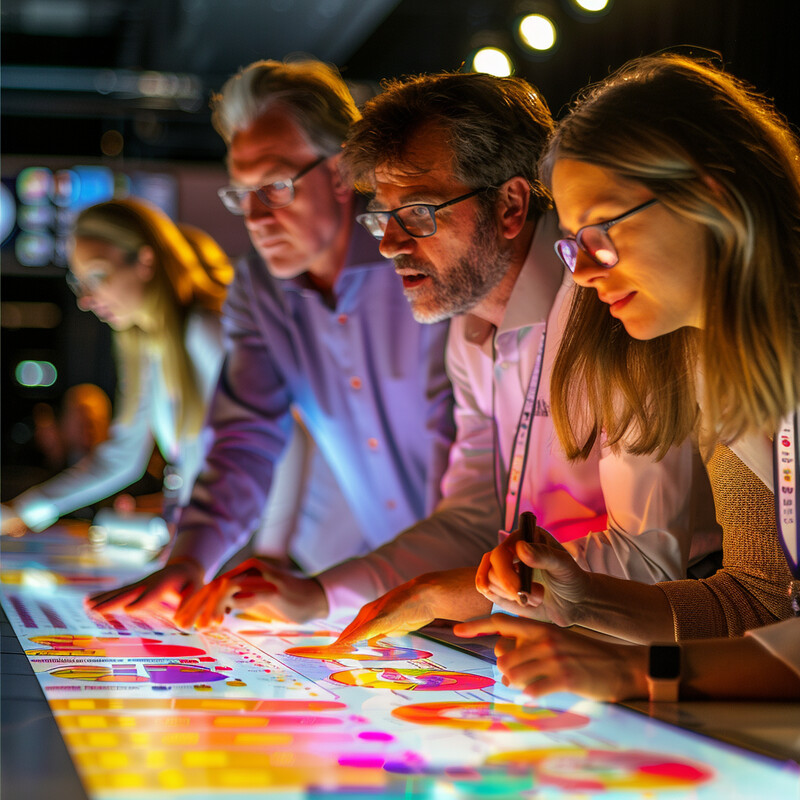
Data-driven marketing strategies powered by AI have proven to significantly improve campaign performance and return on investment (ROI). According to Gartner’s research, companies that leverage AI and analytics for marketing personalization and targeting can increase marketing ROI by 20% to 40% compared to traditional methods. In practice, this uplift comes from multiple efficiencies: AI can automatically segment audiences in ways that maximize response, determine the optimal timing for outreach (for example, identifying when a particular customer is most likely to open an email or browse travel deals), and customize messaging content to each user’s preferences. Major hotel chains have reported that using AI-based recommendation engines on their websites – which show tailored vacation packages or room upgrades to each visitor – has led to higher direct booking rates and larger basket sizes (upsells). For instance, a global hotel brand saw email click-through rates surge after implementing an AI tool that generated personalized subject lines and offers for each loyalty member based on their past stay history. Additionally, marketing AI can quickly A/B test variations of ads or landing pages and roll out the winners, continuously improving campaign effectiveness. The Gartner figures, reflecting broad industry studies, reinforce that these aren’t small tweaks but substantial improvements: a potential 30% average boost in marketing efficiency and outcomes. In a competitive sector like hospitality, that edge can translate into capturing more bookings without proportionally increasing marketing spend – a clear win-win enabled by AI.
9. Food and Beverage Management
AI is helping hotels run their restaurants, bars, and banquets with greater precision and less waste. By forecasting dining demand, AI can predict how many covers (guests) a hotel restaurant will serve on a given night or how much food to prepare for a breakfast buffet, factoring in variables like hotel occupancy, day of week, seasonal ingredients, and even local events. This means kitchens can adjust purchase orders and prep amounts to avoid running out of popular items while also curbing overproduction. AI can also analyze point-of-sale data to determine which menu items are most and least popular, guiding chefs in menu engineering (for example, highlighting a dish that isn’t selling well for possible replacement). Inventory management is streamlined as well – smart systems track stock levels of perishable goods and automatically suggest reorders at the optimal time, sometimes even choosing suppliers based on price or delivery speed. Importantly, AI’s role in F&B extends to reducing food waste: by identifying patterns like consistently uneaten buffet items or predicting cancellation of events, the hotel can proactively scale down production. Some hotels use AI-driven kitchen sensors (or even camera systems like smart bins) to monitor thrown-away food and then receive recommendations on how to cut waste (like adjusting portion sizes or reusing ingredients creatively). All these AI-driven insights lead to cost savings on food, more efficient kitchen operations, and often fresher, better dining experiences for guests because the food is managed in a just-in-time manner rather than large batch cooking that sits out.

Hotels and foodservice operators that use AI for demand forecasting and inventory management have seen a marked reduction in food waste and associated costs. Academic and industry studies report that predictive analytics can reduce food waste by around 30% in hospitality settings, by aligning production with actual consumption patterns. For example, the global hotel company Accor piloted an AI-based waste tracking system in its buffet restaurants and noted food waste weights dropped by roughly one-third once chefs began receiving AI-generated recommendations on how much to cook. In another case, a smart kitchen platform named Kitro (used in Europe) found its hotel clients on average cut food waste by about 30%, and some sites achieved over a 50% reduction, translating to a 2–8% savings in food costs annually. These improvements come from actionable insights such as identifying that too many pastries are left over each morning or that Saturday dinner demand is lower than previously assumed – allowing chefs and F&B managers to adjust purchasing and preparation accordingly. In one hotel’s banquet operations, AI forecasting accurately predicted guest attendance at events, enabling the kitchen to prepare almost exactly the needed amount of meals, dramatically reducing the usual over-preparation buffer. The environmental impact is significant as well: less waste means lower greenhouse gas emissions from decomposing food and more efficient use of water and energy that go into food production. The evidence from such AI implementations shows that hotels can be both more sustainable and more profitable; by using AI to “right-size” their food and beverage operations, they avoid throwing money (and food) into the garbage.
10. Staff Training and Management
AI is transforming how hospitality employees are trained and managed. On the training front, hotels are using AI-driven platforms for e-learning, virtual reality (VR) simulations, and personalized skill development. This means new staff can practice customer service scenarios in a virtual environment – like a VR simulation of handling an irate guest – and the AI will provide immediate feedback or coaching tips. Such immersive training helps employees build confidence and skills faster than traditional classroom methods. AI can also tailor training content to each employee: for example, if a staff member excels at check-in procedures but struggles with upselling techniques, the system will recommend focused modules to improve the latter. In terms of management, AI assists with smarter scheduling and labor allocation. It can forecast busy versus quiet periods (using data on reservations, events, etc.) and create optimal staff schedules that ensure enough coverage during peak times while avoiding overstaffing when it’s slow. This leads to more balanced workloads and can improve employee satisfaction by factoring in individual preferences or overtime avoidance. Additionally, AI tools are used in recruitment and HR – scanning resumes or even conducting AI-based video interviews to help identify promising hires efficiently. Overall, AI in staff training and management leads to a more skilled workforce and a more efficient use of human resources, which ultimately enhances guest service and reduces labor costs or turnover.
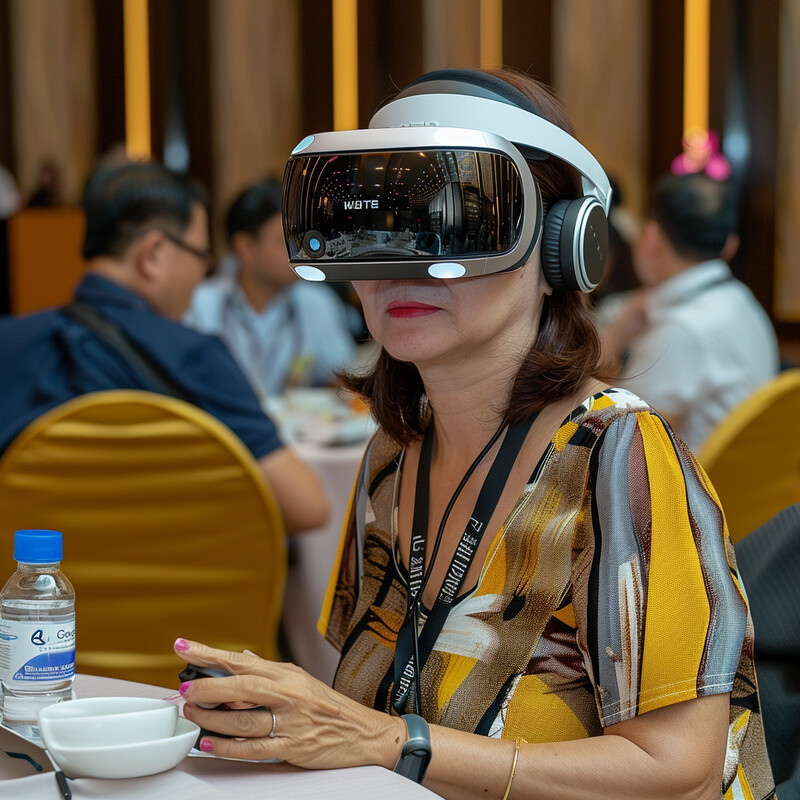
Hotels investing in AI-based training have reported faster training times and better employee performance outcomes. A notable example is Hilton Worldwide’s use of virtual reality and AI for staff training: the company was able to reduce a traditional in-class training session from 4 hours to just 20 minutes by using immersive VR scenarios, without any loss in effectiveness. In fact, the interactive AI-driven training proved more effective – Hilton saw about 87% of team members improve their on-the-job behavior after undergoing the VR training program, indicating a higher retention and application of skills learned. These are staggering improvements in both efficiency and impact. Similarly, other hospitality companies using AI coaching tools have found that employees reach competency faster; for instance, an AI chatbot tutor that quizzes front-desk agents on loyalty program details can significantly cut down the time needed to get those agents fully up to speed. On the management side, AI scheduling at one resort chain led to a 20% reduction in labor costs by optimally timing shifts to guest flow, all while actually increasing staff morale because schedules became more predictable and fair. Furthermore, staff attrition has been observed to drop when AI is used to personalize professional development – employees feel like the company is investing in their growth through customized learning paths recommended by AI. Hilton’s case, however, dramatically showcases the potential: leveraging VR/AI not only slashed training time by over 90%, but also yielded a workforce that demonstrably performs better, which can directly translate to improved guest satisfaction and loyalty.